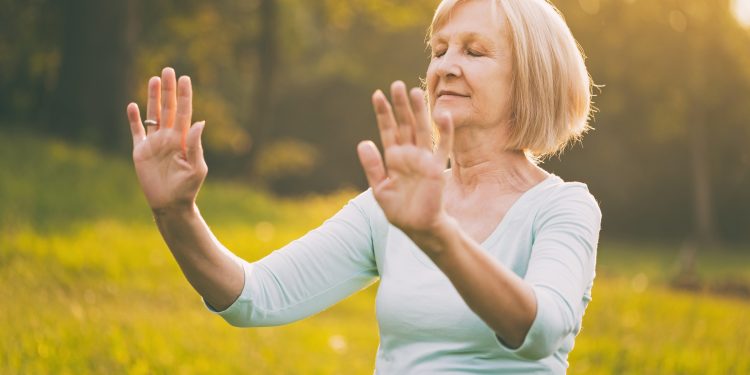Dr. Ayla Wolf DAOM, L.Ac.
How many people describe their lives and their internal state of mind as serene? Serenity, in the wake of a brain injury, can feel unattainable when it may be only one simple movement away. The practice of tai chi originated in China and continues to flourish around the world. One study of adults with traumatic brain injury found that tai chi increased global cognitive and executive functioning to a greater degree than the computerized cognitive training, and the improvements were still significant at the six-month follow-up.
A study by I-Wen Penn and colleagues in a 2019 BMC Geriatrics article used measurements of lower extremity muscle strength paired with functional balance tests, the Berg Balance Scale, a timed-up-and-go (TUG) test, and functional reach testing to study the effects of tai chi on balance. The researchers found individualized tai chi training increased muscle strength of the lower limbs and improved balance in all functional parameters tested.
Tai chi can decrease joint pain from osteoarthritis and even help to regulate the autonomic nervous system and lower blood pressure. The focus of this article is its usefulness for dizziness and vertigo, specific to people with brain injuries.
The brain devotes a lot of resources to knowing exactly where it is in space. It does this through integrating multiple different systems, including the visual system, the vestibular system, and the sensory system. Let’s take the simple act of bending over to tie a shoe. When someone bends forward, their eyes give them visual inputs about the direction they are moving in. The movement of the head, telling them they are bending forward, activates their vestibular system. Their neck muscles also tell them that their head is now in a forward position, and their knees and ankles tell the brain what position the body is in. When someone stands up, the reverse happens. When the input of any of these systems contradicts what the other systems are saying, dizziness and/or vertigo can result.
Tai chi offers a safe and gentle way to help calibrate the integration of visual inputs, vestibular inputs, and sensory inputs through slow, precise, controlled movement. In the brain, there are maps of the head, the neck, the body, and computational grids of the visual world that allow for accurate eye movements and appropriate visual function. While the movements of tai chi may look simple, the resulting brain activity is quite complex, involving the use of all of the maps, and integrating the visual, vestibular, and sensory systems. For example, tai chi involves head-eye following and body-head movements. As a hand moves, the head turns to follow it, moving at the exact same speed while the eyes stay focused on the hand. This exercises gaze stability as well as postural control of the limbs, trunk, and neck. Such movements provide therapeutic rehabilitation of the nervous system, including the vestibular system, cerebellum, and parietal lobe.
Tai chi also requires many cognitive elements involved in focus, concentration, motor planning, motor sequencing, and memory, all of which are highly important aspects of rehabilitation for an injured brain. It does this in a safe, non-threatening, relaxing environment. Such cognitive aspects are functions of the frontal lobe and temporal lobe, making the practice of tai chi a full-brain activity.
Dr. Amy Ayla Wolf is a doctor of acupuncture and oriental medicine specializing in neurological disorders, concussions, and traumatic brain injuries. She is a faculty member of the Carrick Institute of Clinical Neuroscience and Rehabilitation. She teaches courses for healthcare practitioners across the country on neuroanatomy, neurophysiology, functional neurological exam techniques, and neurorehabilitation utilizing acupuncture and Chinese medicine. She also offers advanced courses on concussion recovery. Her online courses and additional resources can be accessed at www.acupunctureneurology.com











